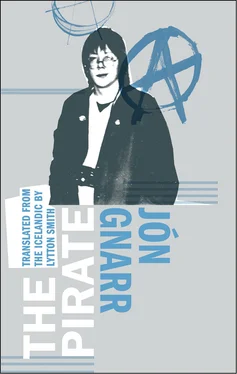Jón Gnarr - The Pirate
Здесь есть возможность читать онлайн «Jón Gnarr - The Pirate» весь текст электронной книги совершенно бесплатно (целиком полную версию без сокращений). В некоторых случаях можно слушать аудио, скачать через торрент в формате fb2 и присутствует краткое содержание. Год выпуска: 2016, Издательство: Deep Vellum Publishing, Жанр: Современная проза, Биографии и Мемуары, на английском языке. Описание произведения, (предисловие) а так же отзывы посетителей доступны на портале библиотеки ЛибКат.
- Название:The Pirate
- Автор:
- Издательство:Deep Vellum Publishing
- Жанр:
- Год:2016
- ISBN:нет данных
- Рейтинг книги:3 / 5. Голосов: 1
-
Избранное:Добавить в избранное
- Отзывы:
-
Ваша оценка:
- 60
- 1
- 2
- 3
- 4
- 5
The Pirate: краткое содержание, описание и аннотация
Предлагаем к чтению аннотацию, описание, краткое содержание или предисловие (зависит от того, что написал сам автор книги «The Pirate»). Если вы не нашли необходимую информацию о книге — напишите в комментариях, мы постараемся отыскать её.
." — "If there were more people like Jón Gnarr the world wouldn't be in such a mess." — The second book in a trilogy chronicling the troubled childhood of international sensation Jón Gnarr,
revisits his teenage years with sincere compassion and great humor: bullied relentlessly, Jón receives rebellious inner strength through the Sex Pistols and Prince Kropotkin — punk rock and anarchy offer the promise of a better and more exciting life.
Jón Gnarr
The Pirate — читать онлайн бесплатно полную книгу (весь текст) целиком
Ниже представлен текст книги, разбитый по страницам. Система сохранения места последней прочитанной страницы, позволяет с удобством читать онлайн бесплатно книгу «The Pirate», без необходимости каждый раз заново искать на чём Вы остановились. Поставьте закладку, и сможете в любой момент перейти на страницу, на которой закончили чтение.
Интервал:
Закладка:
“Are you a retard?”
“No.”
“Okay if I spit on you?”
“No.”
I don’t know why they didn’t leave me alone. I’d never done anything to them. I meant nothing to them and never picked a fight. They simply didn’t like the way I was and went out of their way to make that clear. The random attacks I’d experienced in Bústaðir became daily events at school. All day long I’d keep running into these gangling youths in all sorts of places around the grounds. I tried to hide myself away, but then they sought me out, usually two or three together. I was always on my own. Sometimes they were waiting for me at the front door when school was over. Sometimes they even waited outside the school grounds in places they knew I would go. When they stepped forward, I just stopped. There was nothing else I could do. Fleeing just increased the humiliation. I was powerless to do anything against them. They’d waited the whole time for a chance to beat me up. So I just stood there silently and waited until they were done, had gotten their kicks, and took off. The ritual always began with verbal insults:
“Hey, carrot top, what you doing?”
“Nothing.”
“Why are you so dumb?”
“I don’t know.”
Then the practical part of the bullying would start. Either they’d shove me or grab hold of me, laughing and amusing themselves. When they couldn’t think of any more brilliant insults to say, they’d push me around between themselves and try to knock me to the ground. Their favorite method was when one held me and turned me around in circles while the others stood around and tried to trip me as I was flung in an orbit. When they let me go, the one holding me grasped me in such a way that I rolled down the street. I never said anything and actively tried to show no emotion. Begging for mercy was in vain. Usually they didn’t stop until someone came and asked them to stop or some adult saw them. But often no one came. So it didn’t end until they got tired and walked away laughing.
I started to hate them. I didn’t know why they put so much store in hurting someone they knew nothing about. I couldn’t understand why they despised someone who hadn’t done anything except choose to live his life a certain way. Why couldn’t I be the way I was? I wasn’t bothering them. Were they afraid of me? What were they afraid of? Did I threaten their existence in some way? Did the independence of my peculiarities somehow challenge them? Perhaps my character was too complex for them? Standing face-to-face with violence in this way, day after day, deepened my understanding of it. Perhaps the violence in the world all stems from the same root but takes on different complexions depending upon the nature and circumstances. It begins as a thought and a glimmer in the eyes that becomes words, and then words become acts. Talking smack about someone or humiliating him with words is just the same as violence and physical abuse. It can hurt the same, because the same thinking lies behind it. Violence is all the same even though it takes a variety of forms — it hurts just as much in Reykjavík as in Paris.
As much as I hated these guys, I was absolutely unable to be mean to them. I dreamed about punching them and beating them to pieces, but I couldn’t do it because I was afraid of injuring them. I was afraid that if I punched someone in the face, I would break his teeth. I feared, too, that if I hurt them, they would respond by hurting me more. And where would I punch them? I couldn’t even think about punching someone in the face. Punching them anywhere else seemed pointless. The only thing I really considered was kicking them up the ass. But it wouldn’t have achieved anything. They kicked my ass, and if I did it to them, I’d become like them. I decided that the best thing I could do would be to continue the way I was and not change myself a bit but instead to fortify myself, to become more myself, to never give up and so overcome them eventually.
I tried to arrange my journeys so that I ran into my tormenters as little as possible. After school, I went out the back door and snuck home in a roundabout way. In the morning, I waited outside school and didn’t go in until the school bell had rung and I was confident that everyone had gone into class. Outside of school, I avoided all shops and other places where I knew my tormenters often passed their time. I didn’t talk to anyone about all this. I didn’t want to. I didn’t complain. I also feared that if I tattled it would just get worse. Then they would just have more reason to beat me up, and I feared that what they wanted most of all was to beat the shit out of me.
If I resented Fossvogs School, I hated Rétto. I got a knot in my stomach just seeing the building. I was only ever safe in lessons; I dreaded recess. I made a few acquaintances in class and tried to hang around with them as much as possible and make sure I was never alone. But though I attended class, I learned the littlest amount possible and usually didn’t even have books with me. I didn’t want to learn. I didn’t want to be there. School wasn’t for me. I made a silent agreement with the teachers: you leave me alone, and I’ll let you off the hook. They were mostly satisfied with that; they were burned-out and weary. They all went by nicknames. Pills taught Icelandic. He was a fat, middle-aged man who behaved very strangely. Pills got his nickname because he walked around with a medicine box and sometimes took pills in the middle of class. The story went that he’d once gotten a shock in the middle of a lesson, dropped to the floor, and been taken away in an ambulance. But Pills was a humorist. He thought I was a funny guy and often smiled at my word-twisting and my retorts. He got that I didn’t want to study, and he didn’t try to force any lessons down my throat. In his class, I could come and go freely. If I wanted to go out and smoke, I just stood up and said I was off.
“Okeydokey,” muttered Pills.
He was continually out of breath, and when he spoke he puffed out his words in his exhalations. He expended no unnecessary energy forming sentences, and he spoke quietly. When he talked, he had a strange mannerism of cleaning his teeth with a house key or a pen. This meant that most of what he said was pretty incomprehensible, running together like some porridge of loud respiration, smacks, quieter mumbling, and teeth-scraping. If any other student tried to play the same game as I did, standing up as if to leave, Pills was quick to make the person sit down again. Once a student asked how it was that I could always go when I wanted to, but no one else. Pills answered without looking up:
“It’s because it doesn’t matter whether Jón is here or not, he never learns anything.”
Pills also had a quick temper if he didn’t like something, and he even hit students. Once there was a boy in the class who was trying to throw a glove at another boy but accidentally threw it at Pills. He blushed deeply, grabbed the glove, slapped the boy’s face with it, and yelled at him:
“You are an idiot!”
Although Pills was strange, I liked him a lot. In his own way, he was a punk. He respected my opinions and even admired the way I fought hard against getting an education. Maybe he had, after decades of experience in the school system, come to the same conclusion as me, finding it both inhumane and depressing. Maybe his role as an emissary of the system had destroyed his happiness and his will and made him so depressed that he couldn’t get through the day without drugs.
Most teachers were pretty indifferent and physically exhausted. Some had a reputation for drunkenness and had even been seen hammered somewhere. You could often smell the booze. This was usually very exciting. The Danish teacher was called Bacon. He was as fat as Pills; unlike Pills, he didn’t pop drugs, but he drank wine. Bacon was always drunk in class — a really strong smell of alcohol emanated from him. He kept a hip flask in his jacket pocket. When he took a sip, he turned his butt to the class and pretended to be trying to remember some word or other; he had his sip, turned back, and pretended to remember the word. Usually he only got tipsy, but from time to time he drank a little more than he intended and spoke incomprehensibly, unsteady on his feet and clearly inebriated. We sat right there, watching, thrilled, and tried to keep from laughing. Once he drank so much that he nodded off at his table. He muttered something unintelligible while his head slid down onto the desk. When his forehead touched the table, he paused. We looked curiously at each other, and no one said a word. After a brief silence, he started snoring deeply. Then we all left the room.
Читать дальшеИнтервал:
Закладка:
Похожие книги на «The Pirate»
Представляем Вашему вниманию похожие книги на «The Pirate» списком для выбора. Мы отобрали схожую по названию и смыслу литературу в надежде предоставить читателям больше вариантов отыскать новые, интересные, ещё непрочитанные произведения.
Обсуждение, отзывы о книге «The Pirate» и просто собственные мнения читателей. Оставьте ваши комментарии, напишите, что Вы думаете о произведении, его смысле или главных героях. Укажите что конкретно понравилось, а что нет, и почему Вы так считаете.











